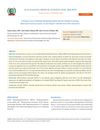 40 citations,
May 1999 in “Journal of The European Academy of Dermatology and Venereology”
40 citations,
May 1999 in “Journal of The European Academy of Dermatology and Venereology” Treat hair loss with finasteride, minoxidil, or surgery; consider side effects and severity.
 3 citations,
December 2016 in “PubMed”
3 citations,
December 2016 in “PubMed” Menstrual abnormalities in PCOS women may not greatly affect their metabolic and hormonal profile.
 32 citations,
April 1999 in “Expert Opinion on Investigational Drugs”
32 citations,
April 1999 in “Expert Opinion on Investigational Drugs” Finasteride effectively treats male hair loss, improving growth and density.
 January 2015 in “Side effects of drugs annual”
January 2015 in “Side effects of drugs annual” The document concludes that sex hormones and related compounds have various effects on health, with both potential benefits and risks.
 July 2011 in “British Journal of Dermatology”
July 2011 in “British Journal of Dermatology” Hormone treatment caused hair loss, finasteride helped regrowth.
 46 citations,
May 2012 in “Molecular and Cellular Endocrinology”
46 citations,
May 2012 in “Molecular and Cellular Endocrinology” Human skin produces sex hormones like estrogen and testosterone, influenced by ARO and StAR, which may affect skin elasticity and hair growth.
 12 citations,
January 2019 in “Journal of Endocrinology”
12 citations,
January 2019 in “Journal of Endocrinology” Baicalin may help reduce excessive male hormone levels in PCOS.
 4 citations,
January 2015 in “Endocrinology & metabolic syndrome”
4 citations,
January 2015 in “Endocrinology & metabolic syndrome” Testosterone can cause acne and male-pattern baldness, affects hair growth in men and women, and makes male skin more sensitive.
 1 citations,
May 2017 in “Maturitas”
1 citations,
May 2017 in “Maturitas” The document concludes that managing health issues like menopause, cardiovascular risk, and hair loss is crucial for promoting longevity in aging women.
January 2024 in “Cosmetics” Menopause worsens skin, hair, and nails, affecting self-esteem and quality of life.

The study aims to create a model to improve personalized and preventive health care.
 February 2024 in “Endocrinology and Disorders”
February 2024 in “Endocrinology and Disorders” Balanced hormones are crucial for women's health, and can be managed with lifestyle changes or hormone therapy if needed.
 July 2024 in “Skin Appendage Disorders”
July 2024 in “Skin Appendage Disorders” Certain medications, including some immune drugs, contraceptives, and hair loss treatments, are often linked to hair loss.
 4 citations,
January 2012 in “Journal of the Egyptian Women's Dermatologic Society (Print)”
4 citations,
January 2012 in “Journal of the Egyptian Women's Dermatologic Society (Print)” Women with female pattern hair loss may have a higher risk of developing metabolic syndrome.
4 citations,
October 2023 in “Journal of clinical medicine” Women with PCOS are much more likely to experience depression.
 59 citations,
February 2021 in “BMJ”
59 citations,
February 2021 in “BMJ” High doses of cyproterone acetate increase the risk of brain tumors in women, but the risk decreases after stopping the medication.
 35 citations,
May 2012 in “Cochrane Database of Systematic Reviews”
35 citations,
May 2012 in “Cochrane Database of Systematic Reviews” Minoxidil effectively treats female pattern hair loss.
 21 citations,
May 2016 in “The Cochrane library”
21 citations,
May 2016 in “The Cochrane library” Topical minoxidil helps treat female pattern hair loss, but more research needed for other treatments.
 27 citations,
April 2013 in “Reviews in endocrine and metabolic disorders”
27 citations,
April 2013 in “Reviews in endocrine and metabolic disorders” The document concludes that using LC-MS/MS for measuring androgens is more accurate than older methods, but it needs careful validation and standardized references to be most effective.
 January 2018 in “Springer eBooks”
January 2018 in “Springer eBooks” Lasers are less favored for hair transplant surgery but show promise for hair growth in controlled trials.
 14 citations,
January 2001 in “Primary Care Update for Ob/gyns”
14 citations,
January 2001 in “Primary Care Update for Ob/gyns” Primary care doctors should address female sexual dysfunctions to improve women's sexual health and life quality.
 October 2021 in “Acta Scientific Medical Sciences”
October 2021 in “Acta Scientific Medical Sciences” A woman was diagnosed with a rare adrenal gland cancer that did not show usual hormone-related symptoms.
 6 citations,
September 2019 in “Journal of cosmetic dermatology”
6 citations,
September 2019 in “Journal of cosmetic dermatology” Lower melatonin levels are linked to more skin aging.
 15 citations,
January 2002 in “Gynecological endocrinology”
15 citations,
January 2002 in “Gynecological endocrinology” Hormones affect skin aging and fat distribution, and treatments can help, but only minoxidil is proven for female hair loss.
 April 2014 in “Journal of evolution of medical and dental sciences”
April 2014 in “Journal of evolution of medical and dental sciences” Women over forty can maintain skin and hair health with lifestyle and dietary changes.
 6 citations,
August 2023 in “Fertility and Sterility”
6 citations,
August 2023 in “Fertility and Sterility” The 2023 guideline for PCOS suggests using updated diagnostic criteria, assessing related health risks, and recommends lifestyle changes and specific treatments for symptoms and fertility issues.
 31 citations,
October 2015 in “DOAJ (DOAJ: Directory of Open Access Journals)”
31 citations,
October 2015 in “DOAJ (DOAJ: Directory of Open Access Journals)” Polycystic Ovary Syndrome (PCOS) is not very common among Iranian women, but it's important to prevent it because of the risk of heart disease and infertility.
 August 2023 in “Authorea (Authorea)”
August 2023 in “Authorea (Authorea)” Tinea capitis should be considered in adults with scalp issues for proper treatment.
 61 citations,
June 2016 in “Clinical Medicine”
61 citations,
June 2016 in “Clinical Medicine” PCOS is often linked to insulin resistance and obesity, and weight loss can improve symptoms.
 6 citations,
January 2016 in “Menopause”
6 citations,
January 2016 in “Menopause” Estrogen deficiency, like after menopause or certain surgeries, leads to faster skin aging and health issues.




























